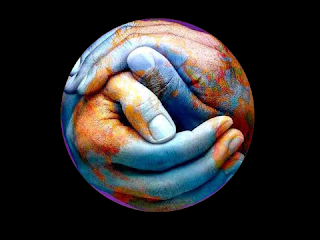The psalmist said in 118:24 “This is the day the LORD has made; We will rejoice and be glad in it.” And yet, even though we human beings see ourselves as the most intelligent life form on earth, our choices and ethical decisions regarding the Earth—the only home planet we know at the moment where we can live, we are responsible for almost all the damage done to the planet. Using the science series called Cosmos, if we were to picture that the earth is aged about 45 or 46 years old, all the damage that we have done to it has taken place only in the last minute of the earth’s life.
The relationship between humans and our home planet is becoming more complex and also exceptionally urgent. Read the internet and the news, and you’ll find stories and reports about pollution, animals becoming near-extent, and other issues such as global warming. Religions have responses to these issues, and today I want to help you understand more about what various sincerely-held views—including Humanism—have to say about environment ethics. It’s my hope that after today, you’ll understand how to relate to people of differing beliefs and that you’ll appeal to new friends in these communities, and to act in unity and solidarity with each other to address these pressing needs.
Sikhism
 Our Sikh friends are very concerned with the relationship between humanity and the environment. Sikhs believe that Waheguru created the world as a place where every type of plant and animal could live so that everything could have the chance to prove that it was good enough to achieve mukti, which is the word for liberation from the cycle of birth and death, reincarnation.
Our Sikh friends are very concerned with the relationship between humanity and the environment. Sikhs believe that Waheguru created the world as a place where every type of plant and animal could live so that everything could have the chance to prove that it was good enough to achieve mukti, which is the word for liberation from the cycle of birth and death, reincarnation.Guru Nanak, the first of the Sikh human gurus, taught and is written in the Sikh holy text, the Guru Granth Sahib:
Nature we see, Nature we hear, Nature we observe with awe, wonder and joy. Nature in the nether regions, Nature in the skies, Nature in the whole creation…Nature in species, kinds, colours. Nature in life forms. Nature in good deeds. Nature in pride and in ego. Nature in air, water and fire. Nature in the soil of the earth. All nature is yours, O powerful CreatorYou command it, observe it and pervade within it.
If you were to read the lives of the human Gurus, they are filled with beautiful and inspiring stories about their love for nature. Did you know that our Sikh friends are forbidden to kill animals just for the sake of killing or to eat to excess, which they consider to be an unnecessary death for an edible creature? In Sikh hymns found in the Guru Granth Sahib, Waheguru is said to provide all of all life, and that in Waheguru’s eyes, there is no difference between the world of humans and the world of nature. Humans and nature are of equal importance to Waheguru, and Sikhs are taught that all life must be treated with respect. The human Gurus made Sikhs aware of our responsibility towards this earth. Within the Guru Granth Sahib, it is written that Sikhs believe that the environment can only be preserved if the balance created by Waheguru is maintained.
The Assisi Declarations on Nature, 1986
In 1986, His Royal Highness Prince Philip (the husband of Her Majesty, Queen Elizabeth II), was, at the time, the President of the WWF International. Prince Philip invited five leaders of five of the world’s major religions to meet with each other to discuss how their faiths, their teachings, ethics and global communities could help save the natural world.
This meeting poignantly took place in Assisi in Italy, as it was the birth place of St Francis, the Roman Catholic patron saint of animals and the natural environment. From this meeting, key statements and commitments were voiced by each of the five faiths, as they outlined their own distinctive traditions and approaches to the care for nature.
In the Assisi Declarations on Nature, the official Sikh statement was:
• Since the beginning of the Sikh religion in the late fifteenth century, the faith has been built upon the message of the ‘oneness of Creation’. Sikhism believes an almighty God created the universe. He himself is the creator and master of all forms of the universe, responsible for all modes of nature and all elements of the world. Sikhism firmly believes God to be the source of the birth, life and death of all things.
• Sikhism teaches that the natural environment and the survival of all life forms are closely linked in the rhythm of nature. The history of the Gurus is full of stories of their love and special relationship with the natural environment-, with animals, birds, vegetation, earth, rivers, mountains and the sky. There is also a very strong vegetation tradition.
• It is for this reason that in Sikhism those who kill for lust of hunting, eating or to make sacrifices are condemned. In Sikh hymns God is often referred to as the provider for all life which God loves and is loved by. God as both father and mother guarantees equality to man and woman in faith and compassion towards all beings and nature.
Christianity
The Bible is the central point of reference for Christian teaching about caring for the environment. For instance, Genesis 1:26 and 28 reads, “Then God said, 'Let us make man in our image, in our likeness, and let them rule over the fish of the sea and the birds of the air, over the livestock, over all the earth, and over all the creatures that move along the ground.'… God blessed them and said to them, 'Be fruitful and increase in number; fill the earth and subdue it. Rule over the fish of the sea and the birds of the air and over every living creature that moves on the ground.'”
Some of our Christian friends have interpreted this story as giving people the right to exploit the environment, and plunder it, we have! However, most Christians that I know view themselves as not having power or dominion over the world that they believe was created by God, but that they are to be responsible and accountable to God with regards to the decisions and consequences in life that they made.
The Bible has very little to say, specifically, about the environment, but it explains the principles of stewardship, another word for responsibility, for God’s creation:
In the Old Testament the Jews were told to rest the land once every 50 years so that it would produce more in the future (Leviticus 25:8-11). They were also ordered not to destroy trees when they were attacking a city:
When you lay siege to a city for a long time, fighting against it to capture it, do not destroy its trees by putting an axe to them, because you can eat their fruit. Do not cut them down. Are the trees of the field people, that you should besiege them? (Deuteronomy 20:19)
Our Christian friends believe that the earth clearly belongs only to God, and not to human beings:
It is clear that the earth still belongs to God not to humans:
The earth is the Lord’s, and everything in it, the world, and all who live in it. Psalm 24:1
In the Christian New Testament, Jesus is reported to have emphasized God’s concern for life, and the pleasure that it brings:
Consider how the lilies grow. They do not labor or spin. Yet I tell you, not even Solomon in all his splendor was dressed like one of these. Luke 12:27-28
The Christian church has recently become more concerned about the environment. The Roman Catholic church made a statement about it in 1988:
The earth and all life on it is a gift from God given us to share and develop, not to dominate and exploit. Our actions have consequences for the rights of others and for the resources of the earth. The goods of the earth and the beauties of nature are to be enjoyed and celebrated as well as consumed. We have the responsibility to create a balanced policy between consumption and conservation. We must consider the welfare of future generations in our planning for and utilization of the earth’s resources.
Even as recently as last year, high-profile Christian leaders have highlighted the importance of taking care of our world. In his encyclical titled, “Laudato Si,” His Holiness, Pope Francis boldly stated, “The Earth, our home, is beginning to look more and more like an immense pile of filth. In many parts of the planet, the elderly lament that once beautiful landscapes are now covered with rubbish."
The World Council of Churches have said: The dignity of nature as creation needs to be bound up with our responsibility for the preservation of life, and in the Declaration on Nature, Assisi, (1986) said: Christians repudiate all ill-considered exploitation of nature which threatens to destroy it and, in turn, to make man the victim of degradation.
Hinduism
Our Hindu friends are very concerned with the relationship between humans and the environment. According to the teachings of karma, resources in the world become scarce because people use them for their own ends rather than with responsibility. People should use the world unselfishly in order to maintain the natural balance and to repay God for the gifts he has given. The Bhagavad Gita says, “For, so sustained by sacrifice, the gods will give you the food of your desire. Whoso enjoys their gift, yet gives nothing, is a thief, no more nor less.”
I remember when we visited India 2 years ago, Hindus treat trees with great respect because it is the most important type of plant life and, like all living things, they believe that trees have an atman, which means a soul. If there is but one tree of flowers and fruit within a village, that place is worthy of your respect.
In the Sanskrit epic from the 9th century CE, the Mahabharata, the god Lord Krishna compares the entirety of the world with the banyan tree because it is large and provides a home for many different creatures. Furthermore, the Hindu concept of ahimsa (non-violence and respect for life) prevents our Hindu friends from causing harm to any creature, and for this reason, many devout Hindus are vegetarian.
For our Hindu friends, the universe is the divine creation, and must be honored in all its parts. Animals and plants, mountains and rivers, everything forms part of earth, and as such, many things are worshiped and revered for the noble qualities they possess. For example, cows are so highly revered that it is banned to kill a cow, and for those that are no longer able to produce milk, they are retired, and not slaughtered. Special sanctuaries called “goshallas” have been created for these animals.
In the Assisi Declarations on Nature of 1986 the Hindu statement was:
• The human role is not separate from nature. All objects in the universe, beings and non-beings, are pervaded by the same spiritual power.
• The human race, though at the top of the evolutionary pyramid at present, is not seen as something apart from earth and its many forms. People did not spring fully formed to dominate lesser life, but evolved out of these forms and are integrally linked with them.
• Nature is sacred and the divine is expressed through all its forms. Reverence for life is an essential principle, as is ahimsa (non-violence).
• Nature cannot be destroyed without humanity destroying itself.
• The divine is not exterior to creation, but expresses itself through natural phenomena.
Islamic belief about the environment
The Holy Qur’an says that Allah (Subhanhu Wataala) is the sole creator of the world. Allah (Subhanhu Wataala) saw fit to appoint humans in the world to serve as his trustees or “viceregents,” as Muslims believe that people are told and commanded to look after the world for Allah (Subhanhu Wutaala) and for the future:
The Holy Qur’an described the earth is green and beautiful. The whole earth has been created a place of worship, pure and clean. Whoever plants a tree and diligently looks after it until it matures and bears fruit is rewarded. If a Muslim plants a tree or sows a field and humans and beasts and birds eat from it, all of it is love on his part.
In the Holy Qur’an, Muslims are instructed to look after the environment and not to damage it. For instance, Surah 30:30 says, “Devote yourself single-mindedly to the Faith, and thus follow the nature designed by Allah, the nature according to which He has fashioned mankind. Do not alter Allah’s creation.”
Muslims have to look after the earth because it is all Allah’s creation and it is part of a human’s duty to Allah. As Surah 13:3—4 says, “Allah is He Who raised up the heavens without any pillars that you can see. Then He settled Himself on the Throne, and constrained the sun and the moon to serve you; each planet pursues its course during an appointed term. He regulates it all and expounds the Signs, that you may have firm belief in the meeting with your Lord. He it is Who spread out the earth and made therein firmly fixed mountains and rivers, and of fruits of every kind He has made pairs. He causes the night to cover the day. In all this, verily, are signs doer a people who reflect.
This passage from Holy Qur’an leads our Muslim friends and neighbors to understand that they are responsible for the world which has been created for them, and that they have to make their own decisions and be responsible for these decisions, with regards to how they treat what they understand is the gift of our planet.
If you read the Assisi Declarations on Nature, the Muslim statement was:
• The central concept of Islam is Tawhid or the Unity of God. Allah is Unity; and His Unity is also reflected in the unity of mankind, and the unity of man and nature. His trustees are responsible for maintaining the unity of His creation, the integrity of the Earth, its flora and fauna, its wildlife and natural environment. Unity cannot be had by discord, by setting one need against another or letting one end predominate over another; it is maintained by balance and harmony. There Muslims say that Islam is the middle path and we will be answerable for how we have walked this path, how we have maintained balance and harmony in the whole of creation around us.
• So unity, trusteeship and accountability, that is Tawhid, Khalifah and Akhirah, the three central concepts of Islam, are also the pillars of the environmental ethics of Islam. They constitute the basic values taught by the Qur’an. It is these values which led Muhammad, the Prophet of Islam, to say: ‘Whoever plants a tree and diligently looks after it until it matures and bears fruit is rewarded.'
• For all these reasons Muslims see themselves as having a responsibility towards the world and the environment, all of which are the creations of Allah.
• Unlike many other religions, Muslims do not have any specific festivals in which they give thanks for the harvest or the world. Instead they give thanks to Allah regularly for his creation.
• In order to separate Islam from other religions, the Islamic year is only 354 days, this means that the months and festivals happen at a different time each year and so there is no particular festival which falls during a period of harvest.
Judaism
Most of our Jewish friends believe that the one G-d whom they worship created everything and all life within the six days of creation, as it is written in Sefer Bereshit, or “Genesis.” Jewish teaching about caring for the environment comes from the TaNaKh (the 24 canonical books in the Hebrew Bible), especially the Torah:
Then G-d said, 'Let us make man in our image, in our likeness, and let them rule over the fish of the sea and the birds of the air, over the livestock, over all the earth, and over all the creatures that move along the ground.' … G-d blessed them and said to them, 'Be fruitful and increase in number; fill the earth and subdue it. Rule over the fish of the sea and the birds of the air and over every living creature that moves on the ground.' Genesis 1:26 and 28. Most Jews revere this passage as it informs them of their responsibility for the world, understanding that G-d made it for them and has trusted them with their ability to ensure it is kept clean and holy.
The Jewish Scriptures do not have a lot to say about the environment. In the Torah, the ancient Hebrew people were commanded to allow their land to rest and recuperate once every 50 years, to ensure that it would remain fertile and arable for them in the future (Leviticus 25:8-11). They were also ordered not to destroy trees when they were attacking a city:
When you lay siege to a city for a long time, fighting against it to capture it, do not destroy its trees by putting an axe to them, because you can eat their fruit. Do not cut them down. Are the trees of the field people that you should besiege them? Deuteronomy 20:19
In the annual festival of Tu B’Shevat (New Year for Trees), Jews demonstrate their respect for trees on the fifteenth day of the Jewish month of Shevat. This has been particularly important since the founding of the State of Israel in 1948 as Israelis have tried to reclaim the desert by planting trees.
Every year, at Rosh Hashanah, or the Jewish New Year, our Jewish neighbors offer thanks to G-d for the creation of the world. Although humanity has the role of steward, the TeNaKh is clear that the earth is still G-d’s possession:
The earth is the Lord’s, and everything in it, the world, and all who live in it. Psalm 24:1
Jews should also show respect to animals:
You shall not muzzle an ox in its threshing. Deuteronomy 25:4
The righteous one knows [the needs of] his animal’s soul. Proverbs 12:10
In the Assisi Declarations of1986, Rabbi Arthur Hertzberg said that:
When the whole world is in peril, when the environment is in danger of being poisoned and various species, both plant and animal are becoming extinct... it is our Jewish responsibility to put the defence of the whole of nature at the very center of our concern… The encounter of G-d and man in nature is thus conceived in Judaism as a seamless web with man as the leader and custodian of the natural world.
Humanism
For myself as a Humanist, I am proud to recognize the seriousness with which theistic communities have given time, money, intellect and passion to addressing the needs of our natural world. Although not all Humanists quote from the Humanist Manifesto, its words inspire me and I agree to the ideals and ethics that are written:
“Humans are an integral part of nature, the result of unguided evolutionary change. Humanists recognize nature as self-existing. We accept our life as all and enough, distinguishing things as they are from things as we might wish or imagine them to be. We welcome the challenges of the future, and are drawn to and undaunted by the yet to be known.
Ethical values are derived from human need and interest as tested by experience. Humanists ground values in human welfare shaped by human circumstances, interests, and concerns and extended to the global ecosystem and beyond. We are committed to treating each person as having inherent worth and dignity, and to making informed choices in a context of freedom consonant with responsibility.”
As a Humanist, and as a person who values the sincerely-held belief of all, I would invite and encourage each of you to find a project, or some other outreach and relief effort that brings justice and restores love and peace to our natural world. As you’ve heard today, the world’s religions teach similar ethics about how we are to treat our environment and ecosystem. Although the religions might not agree with each other about things such as sin, salvation, eternal rewards/punishments, or the authority that certain special texts hold in people’s lives, the religions have shown that all of their followers can work with others to ensure that we leave our planet in better conditions than we have found it…because of our corporate irresponsible behavior and choices. Do not be afraid to work with others because they are different. We are interconnected and need each other to survive on this home called Earth that all living things. May today be the first step in ensuring that we, as a collective humanity, bring justice and love to our neighbors in the trees, fields, rivers, oceans, and skies, who have their own ways of asking for our respect and consideration.


























